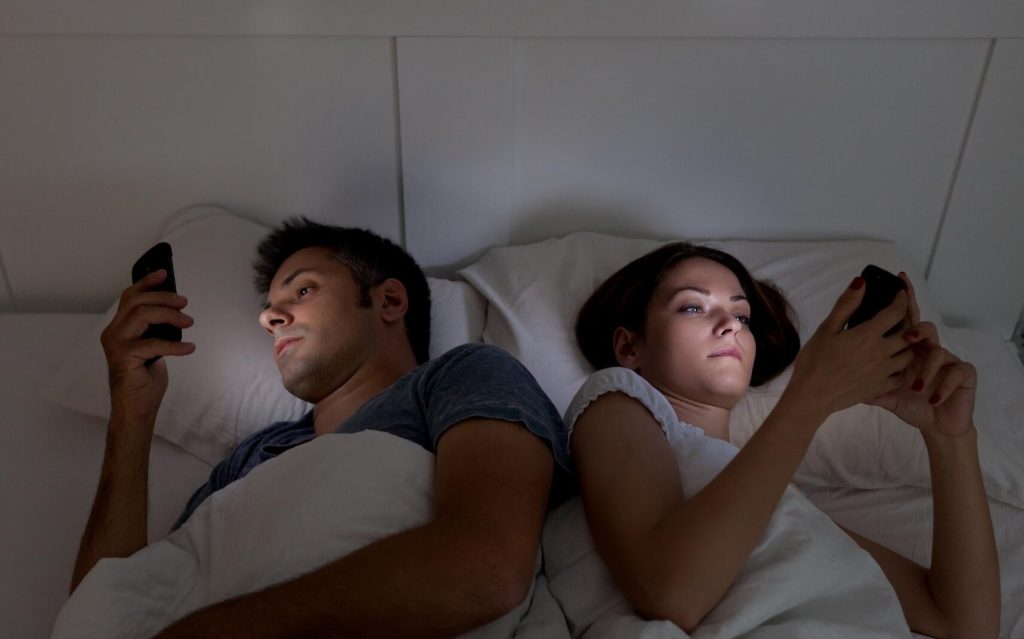Do you have an established bedtime routine? If you are like most people, your routine probably includes putting on your pajamas, brushing your teeth, and climbing into bed to fluff your pillows just the right way.
You probably also pull out your electronic device to help you unwind a little before heading off to sleep.
Everyone has some type of activity that helps them relax. Maybe you are reading the must read book on your device, checking your e-mail, perusing Facebook, or even getting in a few rounds of your favorite game.
Sure, playing on your electronic device can help you relax after a hard day’s work. But did you know that research shows that your relaxing screen time is actually making it harder for you to fall asleep? You may be sabotaging your sleep without even knowing it.
The Blue Screen
Electronic devices are such a major part of our lives. It’s no surprise that we often turn to our electronic devices to check up on Facebook, or peek at one last email, or to even check on the time when we should be focusing on sleep.
Using electronics right before bed is a common practice. In 2014, the National Sleep Foundation found that 89 percent of adults and 75 percent of children have at least one electronic device in their bedroom. Around 95 percent of people also admitted to using an electronic device within an hour of bedtime.
Using electronic devices right before bed could be harming your quality of sleep. The culprit is the blue light that is emitted by the screens on cell phones, computers, tablets, and television.
The bright blue light is emitted from smartphone and device screens so you can see the screen even at the sunniest times of the day.
The blue light also interferes with the production of melatonin, the chemical that helps control your circadian rhythm (sleep and wake cycle). This happens since the blue light mimics daylight and tricking your brain into thinking the sun is out. A reduction in melatonin makes it harder for you to fall asleep when you need to.
Electronic devices also keep your brain alert. As harmless as it seems, knocking out a few emails or watching some YouTube videos before bed can actually trick your brain into thinking it needs to stay awake.
Technology also has an impact on your physical body. The act of playing a video game, watching a movie, or even responding to an email can cause your body to become tense and experience stress.
The physical effects of stress (even good stress) can cause your body to go into a “fight or flight” response. Your body then releases the hormone cortisol to deal with the increase in stress. The release of cortisol makes falling asleep almost impossible [1].
Most people are exposed to technology all day long. You need to be able to give your mind time to unwind without the constant stimulation from electronic devices. Using technology to unwind can cause you to take longer to fall asleep into the deep sleep needed to wake up alert and refreshed in the morning.
Even sleeping with your electronic devices by your bed can disturb your sleep. All of the alerts from texts, emails, calls, calendar reminders, and Facebook alerts, even if your phone is on silent, can cause you to wake up.
Apps and nighttime mode
There are now settings and apps on some electronic devices that have tried to overcome the problems associated with blue light. The new iPhones and iPhones with the iOS 9.3 update have the option of setting your phone on Night Shift.
Night Shift can kick in whatever time you choose in the evening. The mode is designed to automatically adjust your display so that the light is warmer with less blue light.
There are also many different apps available that can be downloaded that help you reduce the amount of blue light your device lets off.
There isn’t a lot of research to show the toned down blue light affects sleep. The less harsh light while easier on the eyes, can still interrupt your attempts at falling and staying asleep [2].
The blue light is just one of the factors of devices interrupting your sleep. What you do with your device can still stimulate your mind and keep you awake.
You know the feeling of anxiety or excitement you get when your phone alerts you to a new message? Changing the color of the light from your device won’t help with that.
As your brain becomes activated, its electrical activity increases and neurons start to race. An awake and active brain is the exact opposite of what should be happening while you are falling asleep.
A better way to unwind
Give yourself at least 30-90 minutes of gadget-free time before going to bed. This includes surfing your smartphone, reading on your device, or even watching television.
Making your room a technology free zone can help eliminate the distractions of your devices. If you need to have your phone in your room, put it in a place where you won’t be tempted to look at it throughout the night.
Winding down with your electronics means that you can become dependent on technology to fall and stay asleep.
The number one way to get better sleep is to turn off your devices. Instead, find technology-free ways to help you calm down and relax. Technology-free methods to fall asleep include: warm bath, taking an easy walk, reading a real book, meditating, or listening to calm music.
If you are worried about your ability to fall asleep, contact one of our sleep specialists today. Sometimes, you need help in figuring out why sleep isn’t coming.









